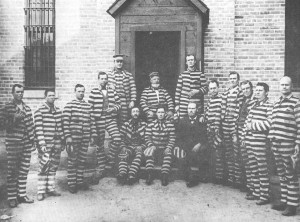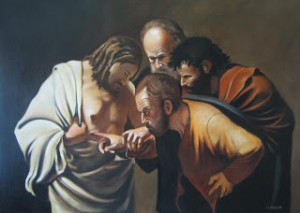I must first express how happy I am that we are having a larger discussion about doubt, but it is an incredibly dysfunctional conversation. Limiting itself to the same paradigm that created the problem. The discussion is stuck on the fact that most if not all doubt is intellectual, but the research has been very conclusive that there are many ways people doubt. We cannot limit this discussion to only intellectual doubt, we must look at the whole complex picture; including, the effects of unexpressed doubt, chronic doubt, acute doubt, institutional doubt, and the multiple variations. We need to look at the various reasons people leave religion and how doubt plays apart. The study by John Dehlin shows a lot of nuance, including cultural issues. There must be systematic studies of why members are leaving this church, the discussion of doubt still reeks of the “oh they were offended” rhetoric, we need to move away from that. I wanted to discuss in this post some of the common misconceptions when debating the Hans Mattsson article in the NYT.
#1 Available Information
It is beyond arrogant and condescending to tell people who have been told over and over to not look at uncorrelated information that it is now somehow their fault that they do not know all the ends and out of church history.
My husband and I moved with our four children ages 4-9 last summer from the US to the UK. I know most people think the church is the same everywhere, but unless you have lived outside of North America (and being a missionary does not count, since you are immersed in Church) there is such a huge disconnect between the US and from my experience the UK. I think that we on the bloggernacle take for granted how many people read this stuff. I am not sure how many people in my ward even know about BYU Studies, FAIR, BCC, or FMH are let alone read them. Broadcast times from SLC don’t line up, and often don’t get rebroadcast mentioned in church meetings. I know they happen because I read a lot of blogs and boards, and I can watch them online. The Internet is still very young. In addition, I think if you live in a non- English speaking country the issues are compounded. I often think many of us suffer from a major case of survivor bias- of course we think that everyone knows what we know, but I think that is just not true- very few people know.
#2 Black and White
One of my largest complaints about the discussion on doubt is that it seems to blame members for not having the ability to think beyond a black and white worldview. While I agree that this is a huge issue, it is evident in so many conversations; however, it is not limited to people who leave it is rampant in believers too. This discussion often originates with very well-educated members who have gained these skills over years of self-study and often years of graduate school. I feel that this complaint is very dismissive or the core problem, and lacks possible solutions. We must ask ourselves why are we not teaching these skills? Where are these individuals supposed to learn such skills? Education rarely teaches children to move past a very binary thought process, a fact that is causing student to be ill prepared for work in a knowledge based economy. I do not see the Church teaching its members how to move into a place where they can deal with the barrage of information that is coming down the pipe. I joke with my husband that the church makes dang good atheists. The black and white thinking comes from the top with quotes like “It is all true or it is all a hoax.” Hmm Sorry that is not the way life works. But I hate that we blame members for living their lives in this paradigm without acknowledging that this flows right from the discourse we hear from leaders, from the manuals, and it overflows into the culture. If we want to move past the black and white mind-set, we must educate, these are very high-level skills, but they can be taught.
#3- Place Information in Larger Context
I learned about polygamy in an 8th grade US History class in California. I think that American Mormons are exposed to that information in history textbooks, something that a child growing up in Sweden would not have been exposed to at school. I think most people in the US think of polygamy when they think of Utah, and so it is harder to hide, but I think they have no compact of the details, and the details are disturbing. We cannot take for granted that members around the world will be able to put Mormon history into a US context, very few Americans could adequately put into context an event in a foreign country.
#4 Emotional, Intellectual, and Spiritual
The way emotional, intellectual, and spiritual struggles are used in these discussions is very irresponsible. First the discussions assume that these are easily to separate. I think that when we assume that reading something is purely an intellectual issue we miss the mark, we dismiss the emotion that often accompany the information, such as betrayal. I do not think that anyone should be callus to dismiss this emotion. I think the feeling would be very similar to emotion one feels after discovering a spouse had an affair through the Internet, with attached proof. I believe it is possible to work through a marriage where your spouse cheats, but it takes a lot of intervention and skill, and often help from trained professionals. But I would personally find it impossible to stay if my husband continued to deny or avoid questions about his behavior, or promised to explain it at some later date. I think for most discovering the unsavory bits of church history is far from a purely intellectual journey.
I think that we also do not teach spirituality in the church, we teach checklists and conformity. I know that may sound rather harsh, but I do think that we do not teach people to dig really deep, to find the transcendent, to find the holy on their own path. I have heard so many talks in General Conference and in church about how it is dangerous to look for spiritual things outside of approved church materials. When I had my faith crisis I was so glad that my relationship with God reached outside of a Mormon paradigm. There is no depth to the spirituality that is taught at church. And we can argue all the time about private religiosity, but I think that it still stands; we do not teach spiritual lessons that are not tied to some kind of checklist or proper behavior.
#5 Take responsibility for culture
One thing I have noticed is the tendency to blame others for their struggles. As a person who studies communities and systems this drives me insane. We need to stop blaming and dismissing these issues. There is a lot of talk about choosing to doubt, choosing be upset by the facts, and choosing to be offended. But we need to be honest that a lot of the stuff is horrifying, and makes it hard to believe. We speak often about being offended- but I have yet to hear a good talk about how not to be offensive. Mormons are often offensive, while also being incredibly kind, but people have every right to be upset by poor behavior.
We need to be aware that we are the receivers of the culture at church, a culture with a long history, with some amazing parts, and some awful toxic bits. I have heard Terryl Givens speak about creating a better culture, but I am not sure how much culture we get to create when we live in system that punishes innovation, and distrusts anything that does not fit the mold. But there needs to be a very real acknowledgement that we have to take responsibility for our culture. I am unsure why the leaders make progressive changes and then don’t ever talk about them in public settings. In the survey I ran a few weeks ago on awareness regarding church policy changes very few people were even aware of church’s changes, including the new scriptures and the revelations in context. I think that all of us need to realize that we do play apart in the culture, but leaders also need to realize that since correlation it is very hard to innovate in the church, and I am not sure who is waiting for whom in this situation. We need to acknowledge that the culture has not caught up to the information coming out of SLC, and that speaking openly about such trials comes at a high social cost.
# 6 Faith and Doubt
I am not sure we even know how to talk about faith very well, let alone doubt. I leave Sunday lessons on faith less sure than when I walked into the lesson. I love that Givens said in the Deseret News article that to “doubt is not a sin”. But we also need to stop thinking of doubt and faith as diametrically opposed to each other. I believe that doubt and faith are opposed in the same way our thumb is opposed to our fingers; they work together, testing and trying each other, pushing faith to seek a witness beyond itself, to become humble, and to find that there are answers not yet considered. To currently live in the church and to try and balance doubt and faith requires that person to live within an amazing amount of tension. We must teach how to process through the complexity and to see the beauty in the nuance, but currently teach the opposite. We can fix these issues, but the conversation is still in its infancy, and we must realize that there are studies on doubt that add layers upon layers to the discussion we have been having in the church, yet we are not utilizing them or recreating them in a Mormon context. It is very clear that the old paradigm is not working, but we have not formalized the new one. I hope that we do not stop too early in this discussion about doubt, thinking that we have arrived because we have exhausted all of the resources we think we have in the Church, we are only a few steps into the process. This is one of my favorite quotes about doubt–
“Abolish all doubt and what’s left is not faith, but absolute heartless conviction. You are certain you possess The Truth (inevitably offered with an implied uppercase “T”) and this certainty quickly devolves into dogmatism and righteousness…by which I mean a demonstrative overweening pride in being so VERY right. In short, the arrogance of fundamentalism.”
There is very good evidence that the best antidote to people leaving religion is to give them something meaningful to do. Service should be transcendent, not insular. We can do better. We can make this discussion powerful, we can dig down and address the real issues, but we must not add more dysfunction into the system.








“I believe that doubt and faith are opposed in the same way our thumb is opposed to our fingers; they work together, testing and trying each other, pushing faith to seek a witness beyond itself, to become humble, and to find that there are answers we have not considered yet.”
Brilliant!!!!
Hi Jessica. I happened onto your site.
I thought it was a from a Christian view point at first, until I noticed some references to Mormonism.
I don’t relate to the experience of one’s spirituality being evaluated according to a checklist of do or don’ts. As a Christian, I have much experience in many churches: Baptist churches, Christian churches, Charismatic churches, Presbyterian Churches, both ‘black’ and ‘white’ and many other ethnic churches, and many I have not listed, both in the U.S. and outside the U.S.
I have exeprienced that relationships and repour center around knowing and loving Jesus Christ; not whether one outwardly conforms to another person’s list of do’s or dont’s.
A dear friend of mine dresses in a ‘looser’ way than I would. I personally could never dress in a way that shows skin like she does. Yet other areas of her Christian walk and virtue and humility and beautiful servant spirit shine so brightly of Jesus, that her dress has never been at issue.
My conservative background and her background (coming to Christ as an adult) influence our ethics of dress. I trust that God is working His purposes in her life, just like He is in mine. He will accomplish His working in us in His way. I have learned so much from her; she looks at me in the same way. Our friendship is over loving Jesus and knowing God; praying together about life’s issues, etc.
I have many friends whose personal ‘do’s and ‘dont’s are different than my own. But they never cause distance between us. If someone loves the Lord Jesus Christ with all their heart…. that constitutes the basis of friendship/fellowship/respect/trust/credibility.
I find this same atitude consistently throughout all the churches that I been in…. other Christians who have personal differences in areas, but it would never diminish our love and fellowship. We would lay down our lives for each other —AND WE DO— even when we are so personally different from each other. Often even as strangers to each other, we do this. The love is based on Jesus, flowing from Him. Because He lavishly loves us we have plenty to pass on.
So my experience has been a contrast to yours.
I recognize that you are not rejecting faith. But I am simply saying that I have not seen this criticalness you are describing.
I imagine that this criticalness could theoretically exist somewhere among Christians. I imagine it can be found in anyone whose faith in Christ is stagnant. I have heard other people describe criticalness. I just haven’t found it; I see vibrant faith in Christ; Christians being real, being transparent with their shortcomings and weaknesses, yet shining with a vibrant faith that is consistent with their life Monday thru Friday.
I respect and appreciate the honesty and transparency of your conversation – I’m not intending to be critical of it. I’m not trying to squelch honest conversation….. I can understand that. And to be fair, I only read your article 1/3 of the way thru before I began my comment. So maybe my comments are unfair. Must go. Leah
Is pointing out the faults of black or white thinking blaming the person? Or is it pointing out a problem they will need to get past to move to a more mature faith? The correlated presentation of the church is made for the lowest common denominator and is therefore by necessity going to be concrete. It is a stage people simply cannot move beyond without traveling through at some point in the beginning. I don’t personally see how it can be avoided but I know it can be transcended. As someone who HATES the choose to be offended line we hear so often and agrees our church discourse could use some work, I don’t see the value in blaming the individual or the church for black or white paradigms. We have to start somewhere. When the inevitable pain comes as we discover black or white doesn’t work all that well, it’s time as Paul said, to put away childish things. I don’t think anything is gained by blaming anyone. The sooner you expand your vision, the sooner you can heal.
In a paper by Ed Gardiner, he suggests that there are four stages to spiritual development. The first is chaos, living in a mindset of no direction. The 2nd state is perception based on black and white. Fortunately/unfortunately all religions are good at leading their people to this stage and no further. This is a good stage for leadership having control of the people. The third stage is again chaos as a person starts realizing and questioning that there is more than black and white, eg. there being more than two sexes and how to resolve that knowledge with the standard black and white thought. Stage four can be called the level of wisdom, an ability to look at the broad rainbow spectrum of colors and understand that there is and why there is more than black and white. The fourth stage is what all religions fear in their members because those members now realize they are gods within and no longer need religions/church leadership to intercede in their behalf. The safe place to be is stage 2, always having someone else with the answers, life is relatively simple. Yet, achieving stage 4 puts us amongst an elect group of people who are spiritualists, whose love goes to all unconditional, whose understanding of humanity transcends cultures, races, genders, sexuality, etc.
That was an excellent read Jennifer, thank you.
Thanks Jessica – it’s been interesting to read the various things after this NYT piece came out and the reactions/perspectives. You touched on a number of great things that need to be considered and recognized.
I agree that this piece has increased the discussions about doubt which is a good thing…. as long as “We can make this discussion powerful, we can dig down and address the real issues, [and} not add more dysfunction into the system.”
Can you add an attribution for that quote at the end?
Try this:
http://m.youtube.com/watch?v=6ORDQFh0Byw
Wow! Well done. Great energy, honesty and scholarship. Thank you, Jessica.
One of my all-time-favorite ideas is that “disillusionment is the beginning of enlightenment.” We need to welcome doubt as a vehicle to greater faith.
I would like to add that I feel part of the dysfunction isn’t mearly in the system of the church or culture in which we swim, but also in the age old problem of “because of the simpleness of the way, or the easiness of it there were many who perished.” [This may sound like blaming the doubter. That’s not what I intend. And I’m not sure I can adequately communicate my compassion and shared pain about doubt in this forum.]
Although you and I and others may look outside the Mormon paradigm at times of faith crisis, I ultimately found my peace in Christ – at the very center of our faith. I was surrounded by all sorts of cultural dysfunction in the heart of Utah Valley. What saved me (along with a good LDS counselor and loving family and friends) was Jesus. Pure and simple.
Anyway, somewhere in here there is a balance between “Look to Christ and live” and “This system is sick so let’s fix it.” I feel both are valid in terms of our doubt/faith process. But looking to Christ gets a lot less air time on the bloggernacle.